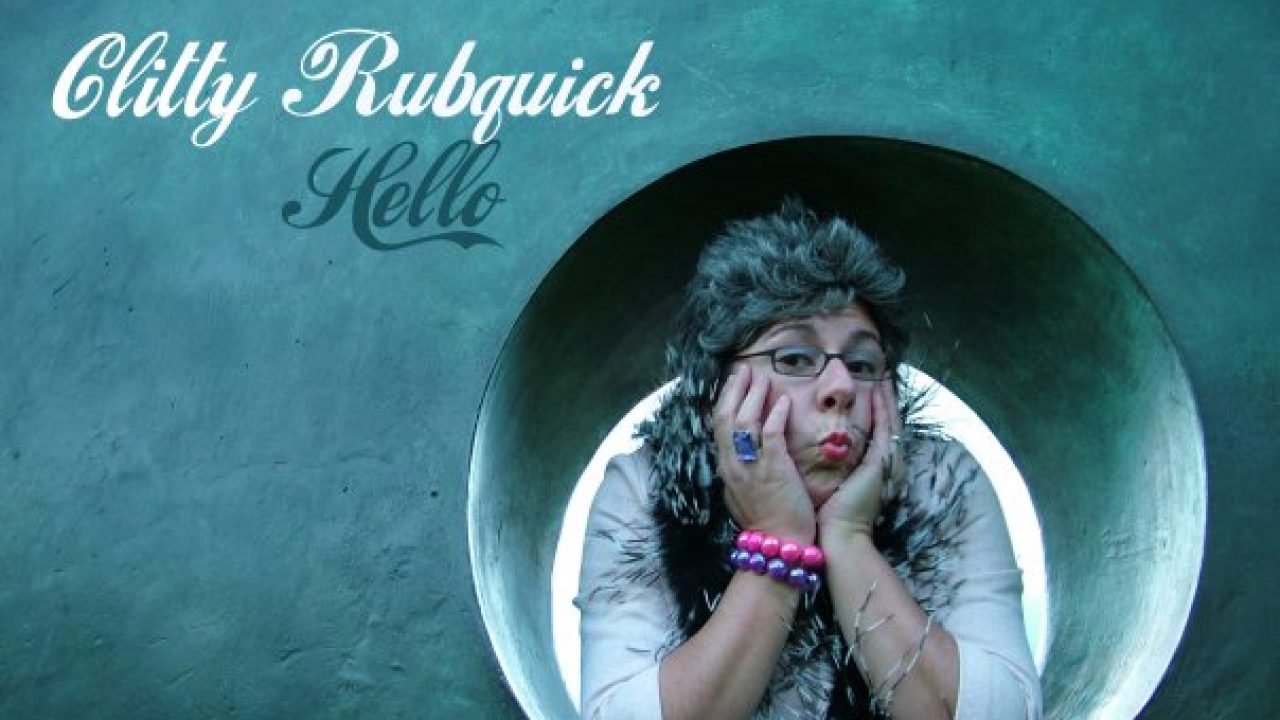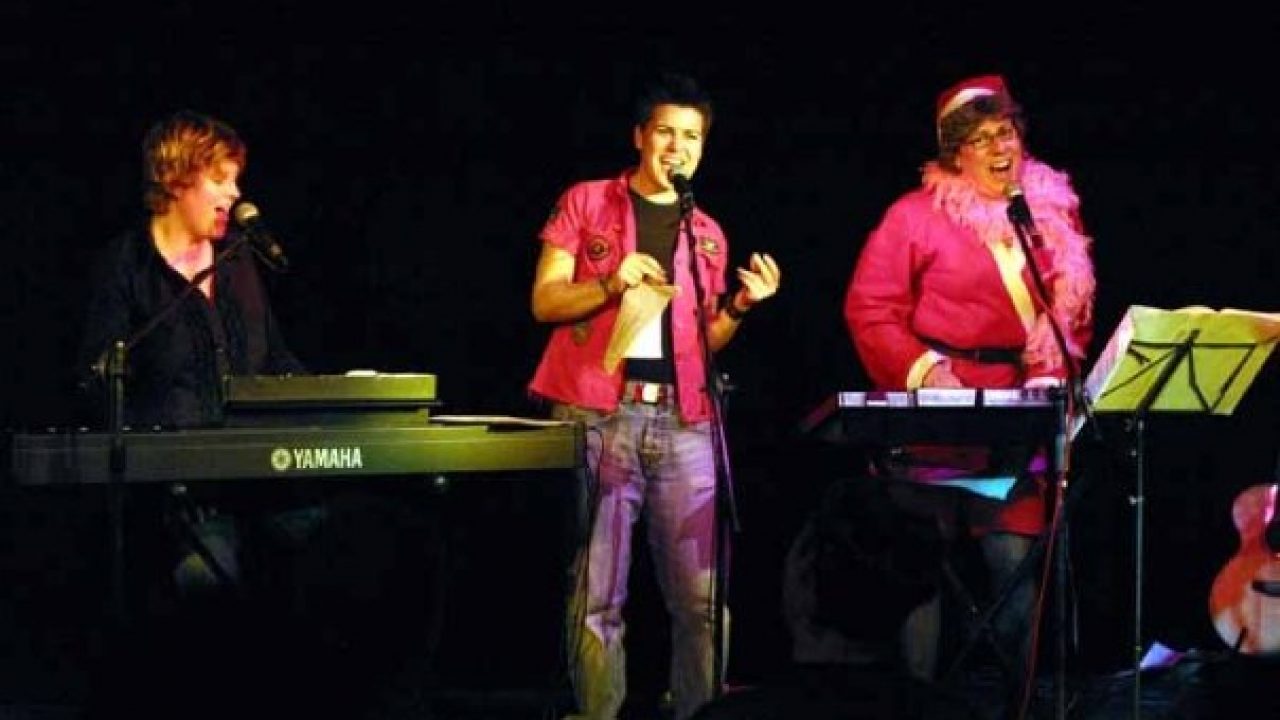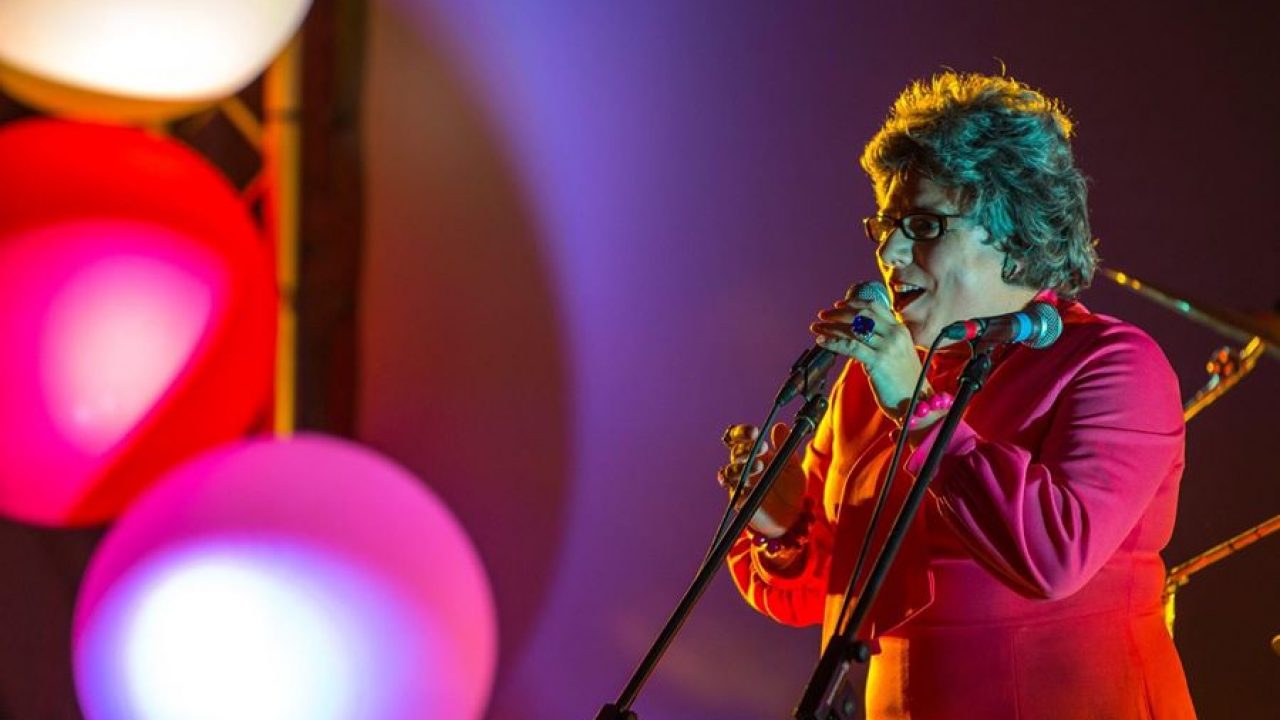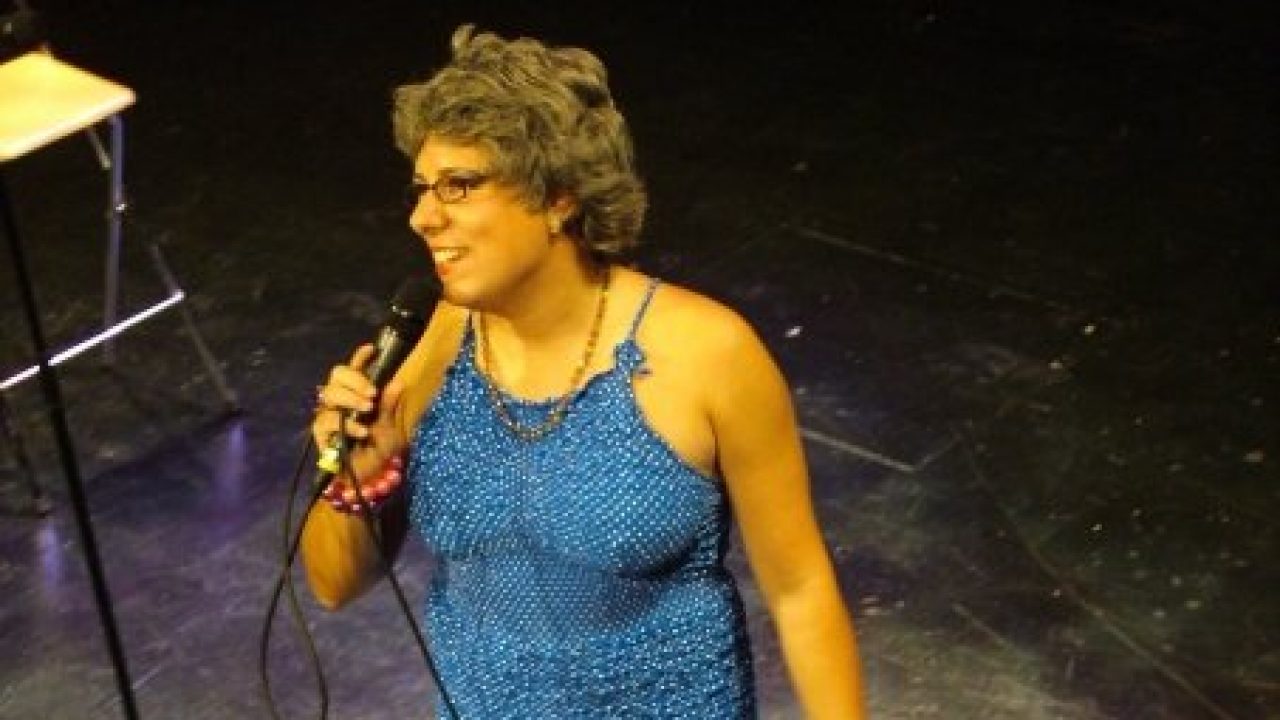Addie Orfila: Full Interview
Interview recorded by Jess Collins on 27.9.2018
Duration 19:04
TRANSCRIPT
Addie OrfilaInterviewed by Jess Collins
27th September 2018
AO: Hello my name is Adelina Orfila; everyone knows me as Addie; my preferred pronoun is 'she'; I was born on 25th September 1975; I live in Chapel Allerton, North Leeds and I identify as a lesbian, although I am happy also to be called 'queer'.
JC: Good. Thank you. Right, so would you like to tell me a little bit about your [unclear] character Clitty Rubquick and tell me how you started getting involved in that and what it means to you.
AO: Yeah of course. So when I… I first came to Leeds in 1994 as a student to study at a university college called Trinity and All Saints in Horsforth and I was really lucky and, like most people, ended up with a group of friends who were like-minded. At that point I didn't know I was a lesbian; I kind of suspected I was, but having been brought up a very strict Catholic, I… I hoped I was going through a phase. Anyway I had a really lovely group of mates and we all used to socialise together and we were fairly eclectic as a group and so, quite often we would end up back at someone's house and I remember one particular evening we ended up back at someone's house and there was a piano and I play the piano. And, but the thing about me playing the piano is I can never remember all the music all the way through, so I ended up drunkenly kind of playing the piano and making lots of mistakes and making everyone laugh.
And it was a bit reminiscent of... there was an act who was quite well known – I guess the '80s and '90s – on a show called the Clive James Show called Margarita Pracatan – who I think she's still actually performing – and Margarita Pracatan's act was – she's Cuban and she's very flamboyant and she plays the keyboard – the Bontempi keyboard – and does kind of... sings like ‘New York New York’ and plays the keyboards really, really badly so it’s actually done... it’s very, very funny and she used to appear on television quite regularly and so someone said, 'Oh your act... you're just like Margarita Pracatan!'
So anyway the next time I ended up at a friend’s house slightly tipsy, you know, at the end of an evening I then got presented with this awful kind of red velour velvety dress which – I'm quite a butch lesbian – which, just frankly, looked ridiculous. I was made to put it on because we were just having a laugh and a joke, and I kind of carried on [unclear] my, you know, I guess I embellished my act and found myself, within a couple of years, kind of doing it semi-professionally and I remember saying to one of my friends, 'I need a name', and he came up with the name Clitty Rubquick, which is so on the nose it's unbelievable, but it always used to get a laugh because my act talked about... I mean it was very... it was kind of Dame Edna meets Mrs Merton so it was kind of a mixture of stand-up and, and music; so kind of one of my character’s kinda pieces is Lionel Ritchie's 'Hello' and, you know, complete with cow-sounds and like, you know, ridiculous kind of like a train running through it and so it’s kind of like so serious, but obviously done really, really badly and I, it turned... yeah I ended up kind of doing it semi-professionally. I found myself on Radio Leeds doing it; I went to Lesvos and did a summer season which was great fun.
I ended up on stage at the City Varieties in an event called ‘L of a Night’ [possible other spellings, e.g. ’elluva night, ’ell of a Night] which had Rhona Cameron who used to be very well known – she's quite well known to people my age and older – a lesbian comedienne who was really famous – and went on tour with Belinda O'Hooley and I used to – yeah, so I did quite a lot of it – I did a lot of Manchester Pride, Brighton Pride – I don't think I ever performed at Leeds Pride because Leeds Pride is, is, has become quite big in recent years but when it was like the Pink Picnic back in the '90s and early '00s I was involved – yeah I’ve performed all over the place actually doing it – and I hosted Blackpool Pride Womens' Space – that was great fun!
And yeah so I kind of had a... I guess... kind of... once I'd graduated and so kind of maybe... and I was obviously fully out by then – and I kind of was welcomed into the lesbian community very much in Leeds and I used to perform at night in, in Chapeltown and like there was a club called Milans which was, it was like a... it was called The Honey Dip disco and like all the lesbians in Leeds used to congregate there and I performed at... and they had lots of talent nights and stuff. So yeah it kind of – it, it... yeah for a time, I mean I still ...
… Bizarrely I still do it once in a blue moon so I've kind of been doing it on and off for twenty odd years. And it’s really good fun. I mean my character's dress... I mean I don't do it as me... my character allegedly comes from Mexico and of course, you know, cultural appropriation in a comedy act a few years ago wasn't obviously so frowned upon so I, if anything, that kind of has diminished massively. But you know, she allegedly comes from Mexico – Acapulco – her catch phrase is, 'Ai, Ai, Ai!', and she's got a grey acrylic wig and she wears a pink crimplene two-piece and, you know, high heels and she thinks she’s the best thing since sliced bread. So it's kind of stand-up and music and I really enjoy it but I don't think I'm going to do much any more just ‘cause of, you know, the day job kinda takes over. I really enjoyed it.
JC: I'm glad you really enjoyed it. So you mentioned music there?
AO: Yeah.
JC: I know you're into, you know, a few different projects including Gay Abandon, Deep C Divas. If you'd like to talk about Clitty Rubquick in this as well that's fine.
AO: OK.
JC: So how do you think like your queerness informs your enjoyment of music? And would you like to speak about any of… thing like that?
AO: Yeah of course. I mean to be honest with you: massively! I'm part of the kind of LGBT choral scene and actually it's a world-wide movement. It's massive. The… I think the impact of being in a community where you're the norm is, is, you cannot underestimate the power of that. And I mean singing is good for you anyway. Singing has got kind of real physiological effects, and psychological effects on well-being, and so you can't underestimate how important being in a choir for someone who is queer can be and how transformative of their life it can be. Certainly I didn't join Gay Abandon at the very start, although my partner Camilla... she was in it virtually from the start – so Gay Abandon it’s actually their twenty year anniversary this year – but I used to go and support them. But I work in... my day job is I work in television so I never used to be able to get to rehearsals so that's why I couldn't join but I was a very active audience member.
And then I… my job changed and I started working at Emmerdale and then Coronation Street so I was able to get back for rehearsals so I did join. So I was in Gay Abandon for about fifteen years and used to stage-manage and organise all their concerts, wherever they were. And the choir, you know, it started off quite small but within a very short space of time it was kind of suddenly then getting to 50-60 people – or active members I should say – the membership is actually larger than that but any one time if you put an event on there would always be fifty or sixty members of Gay Abandon performing. And the impact in the community I think has been really, really big actually, and, like I said earlier, you know, the… I think, we are very lucky in Britain. You know, obviously there are some communities where it’s – in Britain – where it is really difficult to be queer, but I think, you know, here in the UK as a whole we're in a much better situation and so a lot of people can't understand why you might want to sing in a gay choir. But I think it's... it can be a very political act, just by being involved, and being public. You know standing up and singing. So like I remember we sang at all [unclear] – I'm saying, I used to be in Gay Abandon; I left a few years ago – and I'll talk about Divas in a minute – but certainly just by turning up to something and being present and saying, 'You know what! This is who we are and we don't apologise for it... and we're gonna sing and we are gonna make a really good noise and hopefully you're gonna actually take away that actually we are all exactly the same as human beings'. And it's, you know, important to have a sense of being. And actually you can't, you can't beat that really and it's, yeah, hugely enjoyable!
I mean Deep C Divas... I mean next year is Deep C Divas twentieth anniversary year and I've been singing with the Divas – gosh I think it will be for eighteen years. And so we're a different situation Deep C Divas so we're a lesbian acapella group and so there are six of us. And again, you know, we've... Divas is slightly different. I mean Gay Abandon sings abroad as well, but with Deep C Divas we've actually sung in America, in Australia at the Sydney Opera House. We've kind of had great privilege of being able to perform at various events that have taken us globally, you know, and if anything we are much – this will sound so wanky I'm so sorry – but we are less well known in Britain than we are actually elsewhere on the LGBT choral scene. But again the act of saying, 'We are six women who love women. We're not apologising for that and this is who we are and actually we also sing together and actually make a nice noise’, and I think it’s really powerful just being who you are.
JC: Yeah. I agree. And I think... I watched some YouTube videos of you...
AO: Oh OK.
JC: ... as in the Deep C Divas and I know you sound like quite a lot... you seem quite fun, you know, good fun character [unclear] I was going to ask you about, and you mentioned it, kind of the political aspect of it? And kind of on your website you say about that you like to mix – oh God where is it? – 'glitter, glamour and good times' but then you also mention like, mention like feminism and it being a political act.
AO: Absolutely.
JC: So, I know, but I'd like to also maybe... do you want to expand on that kind of thing?
AO: Yeah, I mean I think just, you know, we've like... I went to Warsaw last year with Deep C Divas and that was a real eye-opener 'cause suddenly I was in a place where actually you couldn't really be out and proud, or not without fear of actually some sort of threat of violence or some kind of retribution and so it felt really important to be there and actually be part of this really kind of small, growing LGBT network of singers, you know, and that, I think that's happening more and more, you know. And therefore a lot of queer singers are involved in protest. I mean I would say Deep C Divas we're kind of capital with a relatively small 'p' in that individual... as individuals we're all involved in lots of different things, you know, from, you know... lots of our group support refugees and so... you know, we're all political in our own way but I think there is still mass value in kind of being really publicly out and going to places where it is actually difficult to be that and to show solidarity with other queer people and and, you know, that in itself is really, really important.
I mean with regard to the, the kinda queer singing movement sometimes, you know, we can stick to our comfortable options. I mean like, for example, we take part in a choral festival called Various Voices every four years, you know and that's held – I mean the last few ones have been held in Dublin, Munich, London, Berlin, Paris, so cities which are really diverse and so, you know, we've kind of been very comfortable and kind of cosy, I guess, with that, but we also the next Various Voices is going to take place in Boulogna where actually it's a really different situation and so that in itself will make a massive difference to the people there, the residents and particularly the queer residents, you know to kind of again have a sense of solidarity and community. So, you know, we're not necessarily singing protest songs all the time but I think the fact that there is an ever-growing number of people who are involved in the queer choir movement who meet up, come together and support each other as well.
You know, we're all part of kind of self-led organisations like, for example, the European network which I'm part of is called Legato which is Lesbians and Gays Singing Together, but it also encompasses, you know, all sexual identities not just lesbian or gay. The organisation was set up quite a long time ago. And it’s, you know, adjusting and evolving, I should say, but you know, certainly from a queer culture perspective there are probably millions of queer choirs – choir singers, I should say – and thousands of queer choirs around the world and it's a real privilege to be part of that group really.
JC: Yeah. And how, what, speaking of all of that, you've been so many places and done so many things and that sounds really great and how do you think that has kind of informed you and your identity?
AO: Oh sorry I completely went off-piste there. [laughs]. Well I, if anything it has strengthened my identity. I, and it's opened my eyes, you know, I'm… I think I would have potentially had a... well I would have obviously had a very different life if I had stayed in the closet so for me most of my socialising is with other queer people – not all of it. I am aware of... I naturally gravitate towards other queer people and I do recognise that sometimes I have to break out of my comfort zone. But, you know, I would never have met my wife. I would never, probably, have, you know, met most of my friends actually here in Leeds in Yorkshire had it not been for Gay Abandon primarily. And so for me it so, for me personally it’s about being myself and part of myself is about entertaining, and certainly from the comedy stuff making people laugh and I've always enjoyed being on the stage – as an amateur, you know – but it's also about feeling accepted and not feeling like you're the odd one in the room.
I mean I remember vividly the first time I walked into The Bridge pub here in Leeds as a student, and at that time I was very much questioning my sexual identity, and I suddenly walked in and like, 'cause I had felt like such a fucking freak going to this very Catholic university – as much as I liked Trinity and All Saints and I'm very fond of my time there – there wasn't a massively kind of 'out' presence of the LGBT Group because it was... as a Catholic college they obviously didn't want to kinda promote it and some very brave people were involved in that and I'm embarrassed to say I wasn't brave enough to be involved but I certainly was on the fringes. And myself and my very good friend of mine, who is a gay man, ventured out for the first time ever in to The Bridge and walked in and just suddenly felt a sense of, 'Oh my God I'm not the only one', you know, 'there's other people who look like me’, or a bit like me and actually we don't necessarily conform to societal norms, whatever that means, but actually we're not weirdos and freaks and I suddenly felt like I had a place. And singing in the choirs and being part of that movement has all massively helped with that and about fitting in and feeling like you belong somewhere. And it’s become a family. I've got, I'm very close to my, my family who are my LGBT friends.
JC: That's really great. Do you have any favourite, kind of, I have to ask this, favourite stories or, I don't know, moments you've had with them or maybe like on stage?
AO: Well yeah. I mean I think for me, I mean one of the best moments – well there's several moments actually – but one of them was, one of the best moments I've had was taking part in this event called ‘L of a Night’ [possible other spellings, e.g. ’elluva night, ’ell of a Night] so it had Belinda O'Hooley – so I was involved with two of them – four happened across Yorkshire over... gosh – and one in Wales, sorry – over a couple of years. And so the City Varieti–es was filled; it was packed! It was sold out: there were 750 lesbians and bi-women at the time, this is obviously back in, gosh, 2006, I think, 2005? So it was sold out. And I walked on stage because I was the compere and just standing looking at this theatre filled with positive faces who laughed at my jokes and honestly it was just exhilarating being able to say the first joke and there was a split second and then loads of laughter and it was just so heart-warming and knowing that actually we all were kind of singing from the same page, you know, and that sense of community again; you know, it was really, it was really quite something; there was something really special that night.
And then, you know, for me personally I mean, I had my Civil Partnership back in 2007 and obviously had loads of my friends and family there and that was a phenomenal night because I used to be involved with the Victor Victoria Balls as well which happened at Leeds Town Hall, and so we had – well basically all my friends who were involved in Victor Victoria's we – our First Dance rather than just me and Camilla – we involved all the dancers from the Victor Victoria Ball so we did like a – it was a bit like Strictly Come Dancing – we did like a cha-cha to a piece of music and that was an absolute hoot and Gay Abandon sang at my wedding and that was really cool and our beloved friend Henry, who sadly died a few years ago, DJ'd and he used to be a drag DJ, so he and Andy Fellows who also used to be a DJ dressed up as two elderly ladies doing the music and they actually looked more like my mother-in-law than my mother-in-law. It was amazing, so that was a really cool moment.
Yeah, I mean obviously there's so many; but there's just, yeah, there’s great memories of my life in Leeds so far.
JC: Great. That's a good time to finish it.
AO: Otherwise I'll never shut up
[Laughter]
JC: Thank you so much
AO: Not at all
[END]







